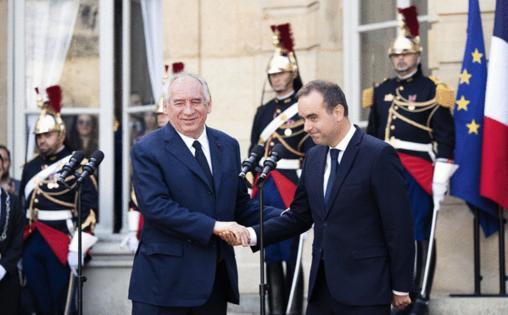France's new premier pledges big changes to work with opposition
Published in News & Features
PARIS — Sebastien Lecornu took over as France’s prime minister pledging big changes as he tries to engage opposition parties in the herculean task of reining in the country’s debt amid hostility to budget cuts.
Lecornu, who served as defense minister in the previous Cabinet, became the country’s fifth prime minister in two years on Wednesday. The last two premiers were ousted after trying to pass budgets that would sharply reduce France’s deficit, the widest in the euro area.
“It will be necessary to change, certainly be more creative, technical and serious in the way we work with our opposition,” Lecornu said in brief remarks at a handover ceremony with outgoing premier Francois Bayrou. “But we will also need sharp change, and not just in terms of form and in terms of method, but also in substance.”
The new premier spoke as a grassroots movement called Bloquons Tout, or “Let’s Block Everything,” closed many schools, affected transportation and led to hundreds of arrests. Labor unions plan mass strikes on Sept. 18 over the prior government’s budget proposals, which they describe as austerity measures.
As one of Emmanuel Macron’s closest allies, Lecornu risks becoming a lightning rod for the rejection of eight years of the president’s policies and his refusal to shift a greater tax burden onto business and the wealthy. That anger has crystallized in parliament after snap elections last year fragmented the lower house into fractious blocs united only by their opposition to Macron.
Investors have reacted to the political and fiscal uncertainty by dumping French assets, driving up borrowing costs relative to European peers. On Wednesday, the yield premium on 10-year bonds over German equivalents traded around 82 basis points — up from around 65 in August, before former Prime Minister Bayrou called the confidence vote that led to his downfall this week.
To try to circumvent the political impasse, Macron has tasked Lecornu with consulting with lawmakers on the budget before picking the ministers to serve in his government. That reverses the conventional steps in France to building a Cabinet and seeks to emulate coalition politics of other parliamentary democracies.
Lecornu said he will begin meeting with leaders of political parties later Wednesday afternoon and labor unions in the coming days.
“This instability, the political and parliamentary crisis we are going through demands humility and sobriety,” he said.
As with his predecessors, the odds are stacked against Lecornu at a moment Bayrou described as “very important, very demanding and very dangerous.”
Far-right leader Marine Le Pen — whom Bayrou’s predecessor, Michel Barnier, tried to work with — has called Lecornu “Macronism’s last bullet,” adding that new parliamentary elections are inevitable.
Socialist lawmakers who helped Bayrou get the 2025 budget through parliament have again refused to take any formal part in the next government, although they are open to consulting the new prime minister on policies.
“Lecornu at Matignon basically means Emmanuel Macron at Matignon,” Socialist leader Olivier Faure said Wednesday on France Info radio, referring to the name of the prime minister’s office. “Michel Barnier and Francois Bayrou were also presented as great negotiators, and then we saw the result.”
The number one issue for Lecornu will be how to narrow the budget deficit. To get any compromise, he may have to slow the pace of retrenchment Bayrou pledged to get the gap to 4.6% of economic output in 2026 from an expected 5.4% this year.
Lecornu gave no indication of what changes he has in mind for the deficit reduction plan. He said he would seek to overcome a “double discrepancy” between the demands of citizens and France’s politicians.
“The discrepancy between the political life and real life of the country is becoming worrying – not just for those in government, but the entire political class,” Lecornu said.
Investors wary of France’s public finances will be watching closely. Moody’s Ratings said in a statement Tuesday that while the country’s economy and finances have outperformed expectations in recent months, the current uncertainty is “credit negative.”
On Friday, Fitch Ratings is scheduled to update its assessment of France’s creditworthiness.
“Whether the next prime minister and government will be able to broker an agreement on a budget that reduces France’s elevated fiscal deficit or at the very least maintain it at the same level in 2026 remains uncertain,” Moody’s analysts said.
A former member of the center-right Republicans, Lecornu is among the most vocal supporters of Macron’s efforts to flex France’s military muscle, which included a sharp increase in the army’s budget and pledges to actively engage in protecting Ukraine.
He indicated in brief remarks at the handover ceremony with Bayrou that the France’s military would continue to be a key priority.
“We can’t let the discrepancy between domestic politics and geopolitics go on forever,” he said. “It will obviously catch up with us.”
©2025 Bloomberg L.P. Visit bloomberg.com. Distributed by Tribune Content Agency, LLC.







Comments